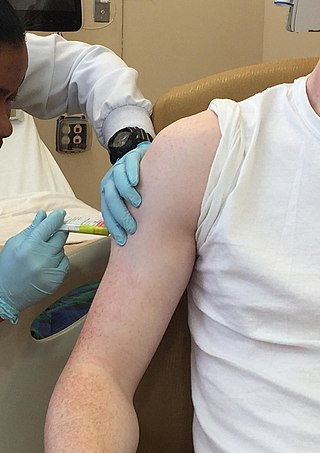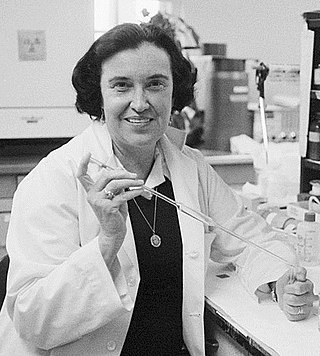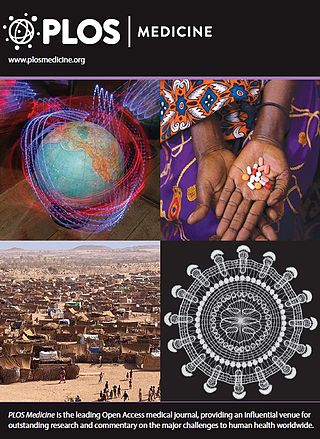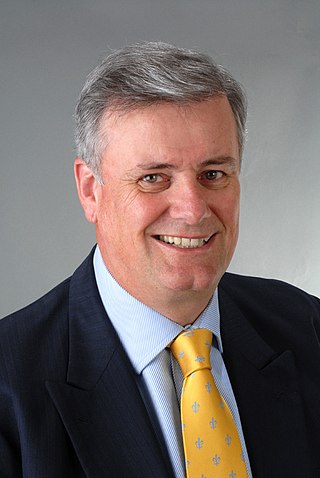Related Research Articles

Medicine is the science and practice of caring for a patient, managing the diagnosis, prognosis, prevention, treatment, palliation of their injury or disease, and promoting their health. Medicine encompasses a variety of health care practices evolved to maintain and restore health by the prevention and treatment of illness. Contemporary medicine applies biomedical sciences, biomedical research, genetics, and medical technology to diagnose, treat, and prevent injury and disease, typically through pharmaceuticals or surgery, but also through therapies as diverse as psychotherapy, external splints and traction, medical devices, biologics, and ionizing radiation, amongst others.

Clinical trials are prospective biomedical or behavioral research studies on human participants designed to answer specific questions about biomedical or behavioral interventions, including new treatments and known interventions that warrant further study and comparison. Clinical trials generate data on dosage, safety and efficacy. They are conducted only after they have received health authority/ethics committee approval in the country where approval of the therapy is sought. These authorities are responsible for vetting the risk/benefit ratio of the trial—their approval does not mean the therapy is 'safe' or effective, only that the trial may be conducted.
Hot flashes are a form of flushing, often caused by the changing hormone levels that are characteristic of menopause. They are typically experienced as a feeling of intense heat with sweating and rapid heartbeat, and may typically last from two to 30 minutes for each occurrence.

Rosalyn Sussman Yalow was an American medical physicist, and a co-winner of the 1977 Nobel Prize in Physiology or Medicine for development of the radioimmunoassay technique. She was the second woman, and the first American-born woman, to be awarded the Nobel Prize in Physiology or Medicine.
Bioidentical hormone replacement therapy (BHRT), also known as bioidentical hormone therapy (BHT) or natural hormone therapy, is the use of hormones that are identical on a molecular level with endogenous hormones in hormone replacement therapy. It may also be combined with blood and saliva testing of hormone levels, and the use of pharmacy compounding to obtain hormones in an effort to reach a targeted level of hormones in the body. A number of claims by some proponents of BHT have not been confirmed through scientific testing. Specific hormones used in BHT include estrone, estradiol, progesterone, testosterone, dehydroepiandrosterone (DHEA), and estriol.

Medical research, also known as experimental medicine, encompasses a wide array of research, extending from "basic research", – involving fundamental scientific principles that may apply to a preclinical understanding – to clinical research, which involves studies of people who may be subjects in clinical trials. Within this spectrum is applied research, or translational research, conducted to expand knowledge in the field of medicine.

PLOS Medicine is a peer-reviewed weekly medical journal covering the full spectrum of the medical sciences. It began operation on October 19, 2004, as the second journal of the Public Library of Science (PLOS), a non-profit open access publisher. All content in PLOS Medicine is published under the Creative Commons "by-attribution" license. To fund the journal, the publication's business model requires in most cases that authors pay publication fees. The journal was published online and in a printed format until 2005 and is now only published online. The journal's acting chief editor is Clare Stone, who replaced the previous chief editor, Larry Peiperl, in 2018.

Marcia Angell is an American physician, author, and the first woman to serve as editor-in-chief of the New England Journal of Medicine. She is currently a Senior Lecturer in the Department of Global Health and Social Medicine at Harvard Medical School in Boston, Massachusetts.
Dame Valerie Beral AC DBE FRS FRCOG FMedSci was an Australian-born British epidemiologist, academic and a preeminent specialist in breast cancer epidemiology. She was Professor of Epidemiology, a Fellow of Green Templeton College, Oxford and was the Head of the Cancer Epidemiology Unit at the University of Oxford and Cancer Research UK from 1989.
Hormone replacement therapy (HRT), also known as menopausal hormone therapy or postmenopausal hormone therapy, is a form of hormone therapy used to treat symptoms associated with female menopause. Effects of menopause can include symptoms such as hot flashes, accelerated skin aging, vaginal dryness, decreased muscle mass, and complications such as osteoporosis, sexual dysfunction, and vaginal atrophy. They are mostly caused by low levels of female sex hormones that occur during menopause.
Patient participation is a trend that arose in answer to medical paternalism. Informed consent is a process where patients make decisions informed by the advice of medical professionals.
Medical ghostwriters are employed by pharmaceutical companies and medical-device manufacturers to produce apparently independent manuscripts for peer-reviewed journals, conference presentations and other communications. Physicians and other scientists are paid to attach their names to the manuscripts as though they had authored them. The named authors may have had little or no involvement in the research or writing process.

JoAnn Elisabeth Manson is an American physician and professor known for her pioneering research, public leadership, and advocacy in the fields of epidemiology and women's health.

Anne MacGregor is a New Zealand-born British medical researcher and clinician based in London. She is a leading researcher in the field of hormonal effects on migraine.

Maryon Stewart is a British author and broadcaster known for her work in the field of non-drug medicine. Specialising in educating and coaching women in how to control menopause symptoms without hormone replacement therapy (HRT), she is sometimes referred to as a pioneer of the "Natural Menopause Movement".
Penny Wise Budoff was an American physician. She was a family practitioner, and a clinical associate professor of family medicine at the State University of New York at Stony Brook. She is known for her research, which established that menstrual cramping is a physical phenomenon rather than a psychological one. She wrote two books on women's health.
Kathleen I. Pritchard, is the head of oncology at Sunnybrook Health Sciences Centre in Toronto, Canada, specializing in breast cancer therapies, and leading the clinical trials division of the centre. She has authored numerous studies on women's health, breast cancer, hormone replacement therapy, public health, and research methodology. According to Thomson Reuters, Pritchard was one of the most cited researchers in the world in 2014 and 2015.

Alastair Harvey MacLennan,, MB ChB, MD, FRCOG, FRANZCOG is a Scottish-Australian physician, professor of obstetrics and gynaecology, medical researcher, and a community health advocate. He studied and practised medicine in Glasgow, Chicago, and Oxford before moving to Australia in 1977 to take up a position at the University of Adelaide, where he went on to become the Professor and Head of the Discipline of Obstetrics and Gynaecology in 2006. He retired from his full-time academic position in 2013, and he is now Emeritus Professor of Medicine. He leads research projects at the Robinson Research Institute, and he is Head of the university's Cerebral Palsy Research Group.
Valerie Montgomery Rice is an American obstetrician, gynecologist, and college administrator. She is the president and dean of Morehouse School of Medicine.

Emily Banks is an Australian epidemiologist and public health physician, working mainly on chronic disease. She is a Professor of Epidemiology and Public Health and Head of the Centre for Public Health Data and Policy at the Australian National University, and a visiting professor at the University of Oxford.
References
- 1 2 3 4 "Elina Hemminki". National Institute for Health and Welfare. 23 Nov 2014. Retrieved 19 Apr 2015.
- ↑ "Home". Health Technology Assessment international. 2015. Retrieved 19 Apr 2015.
- ↑ Hakama, M; Malila, N; Dillner, J (2012). "Randomised health services studies". Int J Cancer. 131 (12): 2898–2902. doi: 10.1002/ijc.27561 . PMID 22461063.
- ↑ Gissler, M; Hemminki, E; Louhiala, P; Järvelin, MR (1998). "Health registers as a feasible means of measuring health status in childhood—a 7-year follow-up of the 1987 Finnish birth cohort". Paediatr Perinat Epidemiol. 12 (4): 437–455. doi:10.1046/j.1365-3016.1998.00126.x. PMID 9805716.
- ↑ McPherson, K; Hemminki, E (2004). "Synthesising licensing data to assess drug safety". BMJ. 328 (7438): 518–520. doi:10.1136/bmj.328.7438.518. PMC 351857 . PMID 14988197.
- ↑ Hemminki, E; McPherson, K (2000). "Value of drug-licensing documents in studying the effect of postmenopausal hormone therapy on cardiovascular disease". Lancet. 355 (9203): 566–569. doi:10.1016/s0140-6736(99)03432-7. PMID 10683020. S2CID 44994747.
- ↑ Veerus, P; Hovi, SL; Fischer, K; Rahu, M; Hakama, M; Hemminki, E (2006). "Results from the Estonian postmenopausal hormone therapy trial [ISRCTN35338757]". Maturitas. 55 (2): 162–173. doi: 10.1016/j.maturitas.2006.01.012 . PMID 16504428.
- ↑ Hemminki, E; Pesonen, T (1977). "An inquiry into associations between leading physicians and the drug industry in Finland". Soc Sci Med. 11 (8–9): 501–506. doi:10.1016/0037-7856(77)90027-0. PMID 929241.
- ↑ "Health Action International". Health Action International. 2015. Retrieved 3 May 2015.
- ↑ "Lääkärin Sosiaalinen Vastuu". Lääkärin Sosiaalinen Vastuu (Physicians for Social Responsibility). 2015. Retrieved 3 May 2015.